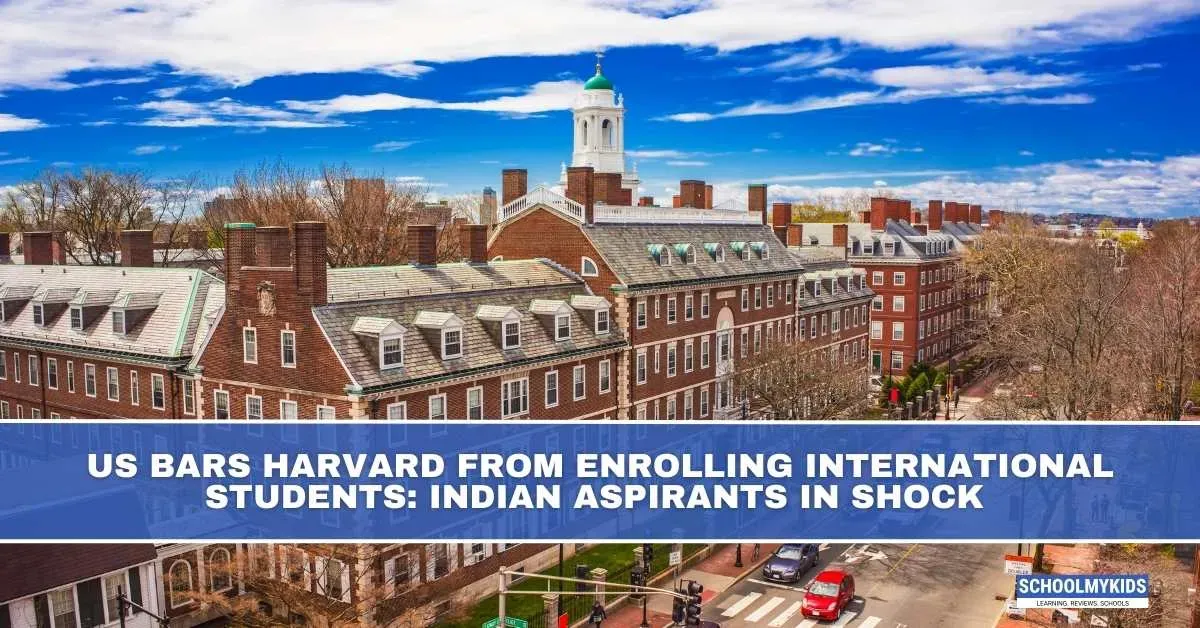In a move that has sent shockwaves through academic and diplomatic circles, the U.S. government has barred Harvard University—one of the most prestigious institutions in the world—from enrolling new international students. This unprecedented step is already having a significant impact on thousands of students globally, especially those from India, who view Harvard as a gateway to opportunity, innovation, and global leadership.
What Happened?
On May 22, 2025, the U.S. Department of Homeland Security (DHS) revoked Harvard’s certification under the Student and Exchange Visitor Program (SEVP). This means the university is legally prohibited from admitting international students on F-1 (academic) or J-1 (exchange visitor) visas for the upcoming academic year.
The move came after allegations of non-compliance with federal reporting requirements, concerns over antisemitic campus protests, and political backlash around Harvard’s handling of free speech and diversity issues. Although Harvard has filed a lawsuit and received a temporary court injunction delaying enforcement, the final decision remains pending and is expected in the coming weeks.
Why Indian Aspirants Are the Most Affected
India sends tens of thousands of students to the U.S. each year, and Harvard is one of the top dream destinations for Indian scholars. Currently, there are over 700 Indian students enrolled at Harvard, and many more are preparing to begin studies in the 2025–26 session.
For Indian aspirants:
- Admissions for Fall 2025 are now uncertain, with Harvard unable to issue I-20 forms, which are essential for securing student visas.
- Those already admitted are in limbo, unsure whether to defer their admission, transfer to other institutions, or look to other countries altogether.
- Students who invested time, energy, and significant money in applications, visa processes, and preparations are now left with emotional and financial distress.
Short-Term Consequences
1. Visa Delays and Cancellations
Students with Harvard I-20s are unable to proceed with their visa appointments. Many scheduled interviews are being canceled or deferred until a legal resolution is achieved.
2. Sudden Change in Academic Plans
Admitted students are forced to seek alternative universities in Canada, the UK, Europe, or within India. Some may face the burden of reapplying, repeating standardized tests, or losing scholarships.
3. Emotional and Psychological Stress
For many Indian families, sending a child to Harvard is a long-cherished dream. The abrupt policy shift has triggered anxiety, confusion, and anger, especially among first-generation learners and students from marginalized backgrounds.
Long-Term Impact on Indian Students
1. Shift in Preferred Destinations
This decision may prompt a larger movement of Indian students toward countries with more stable immigration and academic policies, such as Canada, Australia, Germany, and the UK. These nations are actively courting international students with generous post-study work visas and streamlined pathways to permanent residency.
2. Rising Mistrust Toward U.S. Institutions
Many Indian students and parents are beginning to question whether the U.S. is still a reliable education destination. The fear is not just about Harvard but about future policy unpredictability, especially during politically charged periods.
3. Disruption of Career Timelines
Losing a year can impact internships, job opportunities, and further academic goals like MBA, PhD, or professional licensing. For Indian students who rely on strict timelines due to age limits, family expectations, or financial planning, this disruption is deeply consequential.
Global Implications Beyond India
While Indian students form a significant part of Harvard's international community, students from China, South Korea, Africa, and Europe are also affected. This policy shift could:
- Lead to lower international student enrollment across all U.S. universities.
- Reduce the global competitiveness of American education.
- Force institutions to rethink funding models, as international students contribute significantly to tuition revenue and campus diversity.
- Impact U.S.–India educational cooperation, including student exchange programs and research collaborations.
Harvard’s Response
Harvard has challenged the DHS decision in federal court, calling it unlawful and politically motivated. The university emphasized that international students are central to its identity, and that denying them access undermines academic freedom and global dialogue. A temporary court injunction currently prevents enforcement of the ban, but a final judgment is pending.
What Should Students Do Now?
- Stay Informed – Follow updates from the U.S. State Department, the Harvard International Office, and official Indian educational authorities.
- Keep Backup Options Ready – Apply to alternative universities or defer admissions to the next academic cycle if needed.
- Consult Immigration Experts – Seek advice on transferring SEVIS records, visa statuses, or alternate country pathways.
- Stay Connected with Harvard – Regularly check updates from the university and maintain communication about your admission status.
Conclusion
The barring of Harvard from enrolling international students marks a critical moment in global education and immigration history. While the legal outcome remains uncertain, the incident already reflects deeper tensions around academic freedom, global mobility, and political influence in education.
For Indian students, it is a reminder that success isn’t tied to a single university—even if it’s Harvard. Education is evolving, and resilience, adaptability, and global thinking will be key for this generation of scholars.








Be the first one to comment on this story.